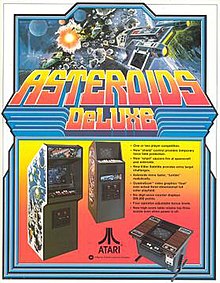1981 video game 1981 video game
| Asteroids Deluxe | |
|---|---|
 Arcade flyer Arcade flyer | |
| Developer(s) | Atari, Inc. |
| Publisher(s) | Atari, Inc. |
| Designer(s) | Dave Shepperd |
| Platform(s) | Arcade, Atari ST, BBC Micro |
| Release | Arcade
1984 Atari ST 1987 |
| Genre(s) | Multidirectional shooter |
| Mode(s) | 1-2 players alternating turns |
Asteroids Deluxe is a multidirectional shooter arcade video game with monochrome vector graphics released in April 1981 by Atari, Inc. It is the sequel to Asteroids and was designed to combat the saucer-hunting strategy of the original allowing experts to play for extended periods. These modifications made it significantly more difficult and less accessible to players. Ports of Asteroids Deluxe were released for the BBC Micro in 1984 and the Atari ST in 1987.
The game was followed-up with Space Duel in 1982 and the more direct sequel Blasteroids in 1987.
Gameplay
Like in the original Asteroids, the objective is to score points by destroying asteroids and flying saucers. The player controls a ship that can rotate left and right, fire shots straight forward, and thrust forward. When shot, larger asteroids break apart into smaller pieces and fly in random directions, while the smallest asteroids are destroyed when hit. Deluxe replaces the hyperspace feature with shields which deplete with use. This game also introduces the "Killer Satellite", a cluster of ships that break apart and chase the player's ship when hit. Objects "wrap" from each edge of the screen to the opposite edge (e.g. from the right edge to the left, or the top edge to the bottom), as in the original.
In addition to the shield feature and the Killer Satellite, the most significant change in this version of the game is that the flying saucers can now target the player's ship across the screen boundary - meaning that if the saucer is close to the left edge and the player is at the right edge, the saucer may shoot toward the left edge and across the boundary to hit the player since their ship is closer that direction. In Asteroids, the saucers could only fire directly at the player's location on screen without considering the boundary, which led to the popular "lurking" exploit that enabled players to play for very long periods of time on a single credit. This updated strategy was in direct response to that exploit.
Development
The Asteroids Deluxe arcade machine is a vector game, with graphics consisting entirely of lines drawn on a vector monitor, which Atari described as "QuadraScan". The key hardware consists of a 1.5 MHz MOS 6502A CPU, which executes the game program, and the Digital Vector Generator (DVG), the first vector processing circuitry developed by Atari. The DVG used for Asteroids Deluxe was designed by Wendi Allen (then known as Howard Delman), and used earlier in Lunar Lander and Asteroids.
Most of the sound effects are implemented by custom circuitry, but some are generated via the POKEY sound chip.
References
- Rouse, Richard (2005). Game Design: Theory & Practice. Wordware Pub. p. 92. ISBN 978-1-55622-912-1.
I did not do Asteroids Deluxe. It was done by David Shepperd.
- "SEC Info - Atari Inc".
- "The Asteroids 'Lurker'". Electronic Gaming Monthly. No. 103. Ziff Davis. February 1998. p. 91.
- ^ "Asteroids Deluxe". Arcade History.
- Sullivan, George (1982). How to Win at Video Games: A Complete Guide. Scholastic Book Services. pp. 81–82. ISBN 978-0-590-32630-8.
In fact, in the first few months after Asteroids Deluxe was introduced, it proved so difficult that many players turned their backs on the machine.
- Hawken, Kieren (June 6, 2017). The A-Z of Atari ST Games: Volume 1. Andrews UK Limited. pp. 9–10. ISBN 978-1-78538-701-2.
- Staff Writer (May 10, 1981). "'Asteroids game': trying to stay alive". Poughkeepsie Journal. Poughkeepsie, New York.
- Margolin, Jed (April 22, 2001). "The Secret Life of Vector Generators". Jed Margolin's Website. San Jose, California.
External links
- Asteroids Deluxe at the Killer List of Videogames
- Asteroids Deluxe at Atari Mania
| Atari's Asteroids | |
|---|---|
| Games | |
| Related | |
| Developers | |